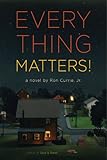 Much of Everything Matters! by Ron Currie Jr. is narrated by an all-knowing entity who speaks in the royal we, and tells our hero, Junior Thibodeau, all sorts of pertinent information: for instance, that his father prefers not to talk and that the world will be obliterated by a comet in 36 years. What does one do when born with the knowledge of the apocalypse? This premise might sound absurd, and I guess it is–but it’s also aesthetically fascinating. The narrator is not only introducing this world to us, he is introducing it to Junior. The usual reader-character roles have been flipped: instead of me feeling like Junior, Junior feels like me. And then it flips back, and I’m with Junior, in his world, in his emotional landscape. It’s a real pleasure to watch Currie braid this omniscience with Junior’s much narrower (and human) perspective, and for the action of the novel to absorb its all-knowing voice in the interest of narrative drive. Structurally, the book ends twice, as if our author were testing out narrative possibilities, the roads not taken, and including them in a single novel. How does one choice, one action, affect the next? This is a fun question, and the reader gets to discover the answer(s) along with Junior.
Much of Everything Matters! by Ron Currie Jr. is narrated by an all-knowing entity who speaks in the royal we, and tells our hero, Junior Thibodeau, all sorts of pertinent information: for instance, that his father prefers not to talk and that the world will be obliterated by a comet in 36 years. What does one do when born with the knowledge of the apocalypse? This premise might sound absurd, and I guess it is–but it’s also aesthetically fascinating. The narrator is not only introducing this world to us, he is introducing it to Junior. The usual reader-character roles have been flipped: instead of me feeling like Junior, Junior feels like me. And then it flips back, and I’m with Junior, in his world, in his emotional landscape. It’s a real pleasure to watch Currie braid this omniscience with Junior’s much narrower (and human) perspective, and for the action of the novel to absorb its all-knowing voice in the interest of narrative drive. Structurally, the book ends twice, as if our author were testing out narrative possibilities, the roads not taken, and including them in a single novel. How does one choice, one action, affect the next? This is a fun question, and the reader gets to discover the answer(s) along with Junior.
 Big Machine by Victor LaValle is a very different book, but it’s got that same risk-taking playfulness. It’s smart, it’s really funny, and the world I was pulled into, like Currie’s, was fascinating and weird. The African-American narrator, Ricky Rice, is a former heroin addict with a harrowing past who is called to Vermont to become a “paranormal investigator,” as the book jacket calls it–this is a difficult novel to explain! Ricky Rice is probably one of the best voices to come out of literature in the last…oh, ever, probably. He compares a very small man to a bunion, and says stuff like, “Taking heroin is like sinking into a tapioca hammock.” I loved him. Unlike Currie’s novel, Big Machine is fairly straightforward, first-person storytelling, although the risks LaValle takes are no less big. His are on the level of plot and tone, for he balances the supernatural, the mourning of family members, race relations, and religion with equal dexterity.
Big Machine by Victor LaValle is a very different book, but it’s got that same risk-taking playfulness. It’s smart, it’s really funny, and the world I was pulled into, like Currie’s, was fascinating and weird. The African-American narrator, Ricky Rice, is a former heroin addict with a harrowing past who is called to Vermont to become a “paranormal investigator,” as the book jacket calls it–this is a difficult novel to explain! Ricky Rice is probably one of the best voices to come out of literature in the last…oh, ever, probably. He compares a very small man to a bunion, and says stuff like, “Taking heroin is like sinking into a tapioca hammock.” I loved him. Unlike Currie’s novel, Big Machine is fairly straightforward, first-person storytelling, although the risks LaValle takes are no less big. His are on the level of plot and tone, for he balances the supernatural, the mourning of family members, race relations, and religion with equal dexterity.
If Big Machine goes off the rails somewhat by the end, and if its horror-novel roots take over a bit too much for my taste, I forgive it, because, like Everything Matters!, it’s ballsy. Both Currie and LaValle aren’t afraid to dispense with the everyday rules of the universe, and they still manage to hold onto lyricism and authentic characterization. Both of these books were wild and weird, but they also were heartbreaking. They don’t fall into the clever-trap.
These two novels represent a real freewheeling lust for the original in contemporary fiction. I’m excited to be a writer, working in their wake.









